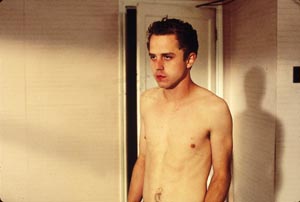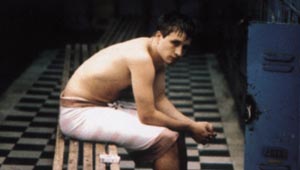 
|
|
|
|

|
 |
 |
International Film Festival Rotterdam
The 27th International Film Festival Rotterdam, the largest film showcase in the Netherlands, unspooled January 28 through February 8 to record attendance. The fest reported 275,000 admissions, a 10% increase over 1997, despite the fact that there was one less venue this year. Credit must be given to director Simon Field, a British expatriate in his second year at the helm of this massive event, and his extraordinary staff for coordinating what is undoubtedly one of the best organized festivals in the world. Rotterdam is both easy to navigate – all of the fest venues are within walking distance from each other – and, for a New Yorker, disconcertingly friendly. The fest’s ticketing process is also apparently trouble free, an achievement at a fest of any size.
 |
| Jesse Peretz's First Love, Last Rites, at Sundance and Rotterdam. Photo: Jesse Peretz |
The programming is also incredibly diverse: unlike most other major international film festivals which are geared exclusively to the theatrical film market, Rotterdam’s Main Program of recent features is virtually dwarfed by its Exploding Cinema sidebar, which includes surveys of underground and avant-garde cinema, multi-media installations, lectures and concerts. Among its highlights were terrfic late-night shows by D.J. Spooky, Mouse on Mars, and D.J.s from London’s Outcaste label; an exhibition curated by producer Michael Shamberg at the Witte de With gallery entitled Home Screen Home, featuring compilations of video art, music videos and short films screened on monitors informally scattered throughout a space decorated with eye-popping wallpaper designed by John Baldessari; and the day-long event, A Day and Night at the Rex, which took place in "the last real sex cinema in Holland," and consisted of performances by Maria Beatty, Michael Atavar, and Ron Athey (the subject of Catherine Saalfield’s feature documentary, Hallelujah, which also premiered), along with screenings of Kirby Dick’s Sick and assorted other transgressive media.
While the Exploding Cinema program (and other sidebars like The Cruel Machine – which included close to 30 features dealing with the theme of cruelty – and the selection of Italian exploitation pictures) crystallized the fest’s adventurous atmosphere, the focus of the event is nevertheless the films premiering in the Main Program, the Tiger Awards Competition, and in its selection of Third World films produced with funding from the Hubert Bals Fund. Between them, these three sections of the festival comprised over 160 features.
Among the highlights of The Tiger Awards Competition, which included 14 features by first or second-time directors each vying for one of three $10,000 cash prizes, were Canadian director Gary Burns wry comedy Kitchen Party (subsequently invited to New Directors/New Films); Jesse Peretz’s moody, Fipresci prize-winning First Love, Last Rites and Mexican helmer Carlos Marcovich’s extraordinary pseudo-documentary Who The Hell Is Juliette? (both of which screened at Sundance); and Stefan Ruzowitzky’s Die Siebtelbauren (The One-Seventh Farmer), a Tiger Award winner. Ruzowitzky, who hails from Vienna, describes his second feature as an Alpine western, but this highly stylized tale about seven servants who inherit the estate of their dead lord, igniting the wrath of the neighboring landowners, is also a new and utterly ironic take on the Heimat film.
The festival’s Main Program included a number of premieres, most notably the fests’s Audience Award winner The Polish Bride by Dutch director Karim Traïdia and two poignantly understated films, Les Sanguinaires by Laurent Cantet (France) and Tamas and Julie by Ildiko Enyedi (Hungary), both of which were produced by France’s Haut et Court and commissioned for the Arte series 2000 Seen By...; the series promises seven more films (by the likes of Walter Salles, Alain Berliner and Tsai Ming-liang) dealing with the "human condition" at the close of the millenium. The vast majority of films featured in the Main Program, however, were not premieres; the section functions primarily as a festival-of-festivals overview of the prior year’s crop. A number of films in this section are also released theatrically in the Netherlands following the festival, all benefiting from the wealth of publicity the fest generates domestically.
While there were a great number of acclaimed films represented in the Main Program, I was particulary struck by Tony Gatlif’s Gadjo Dilo. This infectiously joyous film from the director of Latcho Drom about a young Parisian’s journey into the heart of a Romanian gypsy community will be released stateside by Lion’s Gate this summer. Also notable was Japanese director Saito Hisashi’s debut feature, French Dressing, in which a strange relationship develops between a depressed, narcoleptic schoolboy and the teacher who rapes him to prevent him from committing suicide. (The teacher wants to give the boy a reason to live: hate.) The film’s assured, deadpan delivery undercuts its transgressive subject matter to create a haunting portrait of teenage abjection and marks Hisashi, a veteran screenwriter of TV dramas in Japan, as a director to watch. I also caught up with Youssef Chahine’s Destiny, a prize-winner at Cannes. Picked up jointly by Cinema Village and Leisure Time for domestic release, Destiny is a sprawling melodrama set in the twelfth century that deals with the consequences of Egyptian fundamentalism. While its convoluted plot is often incoherent, its sumptuous cinematography (by Moshen Nasr) is never less than mesmerizing.
 |
| Ildiko Enyedi's Tamas and Juli |
The Hubert Bals Fund (named after the former fest director), which provides funding to filmmakers from the Third World, had a part in the completion of 13 films screening in Rotterdam this year – including Francisco Athié’s well-received premiere, Fibra Optica (Mexico), Dariush Mehrjui’s Leila (Iran), Zhang Yuan’s East Palace, West Palace (China), and Ademir Kenovic’s acclaimed Perfect Circle (France/Bosnia). The Fund is an important resource for filmmakers in underdeveloped countries and is further testament to Rotterdam’s reputation as an advocate of committed cinema.
The festival’s advocacy is perhaps exemplified by CineMart, a unique initiative that this year brought 253 producers looking for production funds together with 142 distributors and 29 television executives from around the world. Unfolding in the Rotterdam Hilton, where over 2,000 meetings were taken by participants representing 53 film projects in just five days, CineMart is an increasingly vital incubator of independent films. (Participating U.S. projects were sponsored by the Independent Feature Project.) Among this year’s market success stories were Rosa von Praunheim’s The Einstein of Sex: The Life and Work of Magnus Hirschfeld, Tsing Ming-liang’s Time Zone, and Lorenzo O’Brien’s Teenangels – each of which secured enough financing to start shooting.
Although it takes place concurrently with the festival, which producers are free to attend if they can find the time, CineMart is not part of the festival proper. One could easily attend the festival without crossing paths with a single industry exec among the thousands of Dutch cineastes. But festival guests are free to lounge in the lobby of the Hilton, where CineMart execs are virtually sequestered, and easily take informal meetings over a quick cocktail.
Rotterdam may be primarily an audience festival and a launching pad for domestic theatrical releases, but its multifaceted programming, together with CineMart – even in what was widely considered a year of lackluster premieres – make for an enormously satisfying event with something for just about everyone.
-
Sundance Film Festival Sundance Film Festival by Noah Cowan
Berlin International Film Festival by Noah Cowan
International Film Festival Rotterdam by Stephen Gallagher
Thessaloniki Film Festival by Scott Macaulay
International Havana by Film Festival by Marco Masoni
CineQuest by Beth Kinsolving
back to top
home page | subscribe | merchandise | history | order form | advertise | contact
archives | links | search
© 2005 Filmmaker Magazine